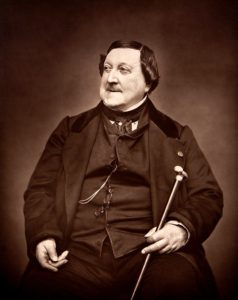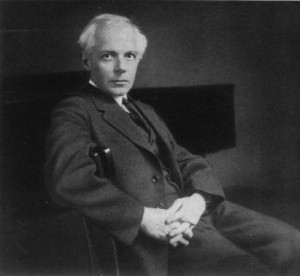On my mind are two famous composers: Gioachino Rossini and Bela Bartók. You would be hard-pressed to find two more different figures, truth be told. Both made their careers during artistically fruitful periods (Rossini, during the early 19th century; Bartók, across the turbulent stretch of years before the First World War to the end of the Second World War). Both are widely celebrated as heroes in their respective homelands of Italy and Hungary. Otherwise, very little unites them.
 Rossini (1792-1868) is nearly as popular today as he was in his own lifetime when he delighted opera-hungry audiences with hit after hit. Then, at age 37, he abruptly put down his pen to spend the rest of his life in Paris as a celebrity and gourmand! In contrast, Bartók (1881-1945) began his musical career in relative quietude, foregoing training in elegant Vienna and devoting himself to absorbing the musical language of his Hungarian homeland. Early in his career, Bartók decided to harness the new technology of the gramophone to preserve the pristine music of the countryside regions increasingly threatened by growing urbanism. Teaming up with his equally dedicated colleague Zoltán Kodály, they trekked endless miles to record, transcribe, and catalogue thousands of authentic folk songs. That musical material reshaped both men’s musical vocabulary in their own compositions.
Rossini (1792-1868) is nearly as popular today as he was in his own lifetime when he delighted opera-hungry audiences with hit after hit. Then, at age 37, he abruptly put down his pen to spend the rest of his life in Paris as a celebrity and gourmand! In contrast, Bartók (1881-1945) began his musical career in relative quietude, foregoing training in elegant Vienna and devoting himself to absorbing the musical language of his Hungarian homeland. Early in his career, Bartók decided to harness the new technology of the gramophone to preserve the pristine music of the countryside regions increasingly threatened by growing urbanism. Teaming up with his equally dedicated colleague Zoltán Kodály, they trekked endless miles to record, transcribe, and catalogue thousands of authentic folk songs. That musical material reshaped both men’s musical vocabulary in their own compositions.
But unlike Rossini, who chose to lower the curtain on his own theatrical career, Bartok’s line of success was fractured by the chaos of Fascism’s rise. Bartok had made his position on Hitler’s atrocities known, and had little choice but to flee to the safety of the United States in 1940, leaving virtually everything behind. Once in the US, his health failed steadily. The last years of his life were difficult, although he continued to focus on his ethnographic work and produced a handful of astonishing final compositions.
So why do I have these men floating around in my mind today? Well, for July, the opera in our series A Night at the Opera happens to be Rossini’s Il barbiere di Siviglia (The Barber of Seville). We started this series at the beginning of the 2020 shutdown, both to stay contact with you and to explore what one could, in fact, do on Zoom. If you have followed this series, you may remember our first presentation: a night spent with Rossini’s utterly delightful Cenerentola (Cinderella).
I’ll never forget that first session, both because I was unusually nervous about the new medium (Zoom) and because our electricity went out at the three-quarters’ mark, right before we were to hear some glorious singing by one of the heartthrobs of today’s opera world: tenor Juan Diego Flórez! No electricity? No Zoom? End of show! We did record the conclusion the next day. All of the recordings are this page.
We’ve covered a lot of operatic ground since then—from Mozart to Wagner to Tchaikovsky to Rodgers & Hammerstein. And now we are returning to Rossini, whose handsome suitor to the captive ward Rosina, Count Almaviva, is aided in his amorous quest by the lovable rascal Figaro. And, by the way, two members of the cast we highlighted for Cenerentola will be highlighted again with The Barber of Seville: Juan Diego Flórez, who has made Count Almaviva a signature role, and Joyce di Donato, our winsome Cinderella returned as a triumphant Rosina.
 But what of Bartók? Will he appear in A Night at the Opera? Not yet, although he composed an astonishing opera called Bluebeard’s Castle that we will present in the future. But watch out when we do! Bluebeard’s Castle will curl the hair on the back of your neck (with lush music along the way)!
But what of Bartók? Will he appear in A Night at the Opera? Not yet, although he composed an astonishing opera called Bluebeard’s Castle that we will present in the future. But watch out when we do! Bluebeard’s Castle will curl the hair on the back of your neck (with lush music along the way)!
Bartók is on my mind, rather, due to focusing on him for a feature Hank and I created recently called Composer of the Month. Responding to the interest expressed in “Composer Studies,” I decided to recast the concept and create an offering each month that places one composer in the midst of carefully selected performances, works of art and literature, history, and documentary clips including master classes. After laying out the initial parameters, Hank finds himself spending hours scouring for lively, legally available performances, photos, art, and video clips to bring the material to life. Think of it as a dinner party where the host picks the table setting, menu, and guest list, but the attendees must provide the excitement.
We have been choosing composers whose works have influenced music in significant ways or whose pieces we just plain admire: Beethoven, Rachmaninov, Schubert, et al.—and now Bartók. But Bartók may be new to a lot of people. Music students in the US tend to encounter Bartók first in their teens, perhaps learning his Dances in Bulgarian Rhythm or a whirlwind piece like Allegro barbaro. Or, maybe they get to play a thrilling work like Music for Strings, Percussion and Celesta in youth orchestra or in college. It takes time before these students can appreciate the exhaustive work Bartók and Kodály did to capture, transcribe, and catalogue those thousands of folk songs buried in the ravines and mountains of Central Europe. Even more time may pass before they realize the tragedy of a mature artist like Bartók having to lock the front door of villa in Budapest and leave Hungary forever (as it turned out), fleeing to an utterly foreign world (America), just a footstep ahead of the terror wreaked by National Socialism.
So if you’ve not visited our Composer of the Month pages, we invite you to do so. To facilitate this, we are unlocking several of the pages for the whole month of July so you can dive into the music, tour the world of these featured artists, and plan your studies for the fall. Each monthly offering proceeds step-by-step and background is needed. We promise: you will emerge with a heart full of wonderful music and an inspired (and joyful) sense of what these composers gave the world.




Thank you for so many rich resources! I have recently been listening to Bartok’s “Out of Doors” – particularly the 4th movement – because it mimics cicadas. So much to be learned! What I love is that we can NEVER learn it all in the world of music. There is always something beautiful and fascinating to discover.
Of course I will now be thinking about The Barber of Seville and Rossini! 🎵